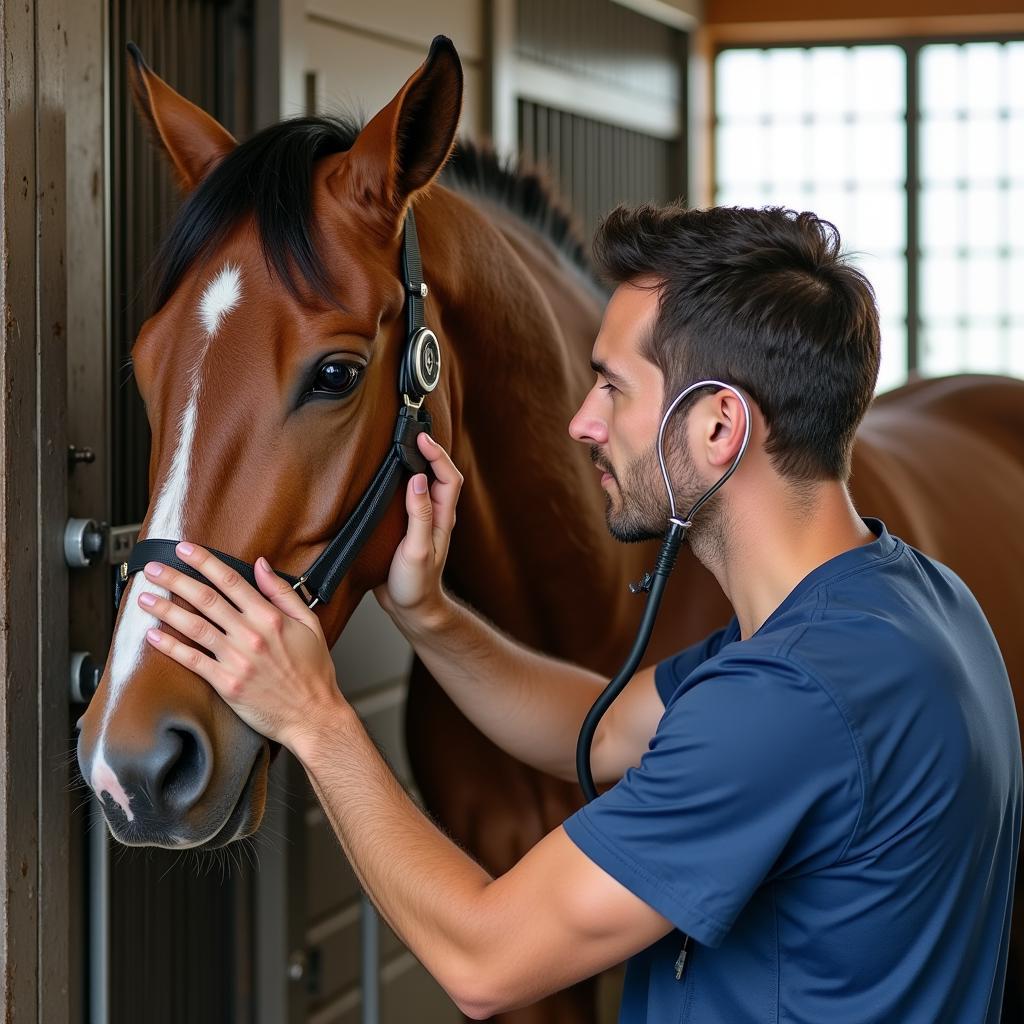Keeping ticks off your horses is crucial for their health and well-being. Ticks transmit a variety of diseases that can cause serious problems, from mild discomfort to life-threatening illnesses. Understanding effective tick control strategies will help protect your equine companions.
Understanding the Tick Threat to Horses
Ticks are more than just a nuisance; they are vectors for diseases like Lyme disease, anaplasmosis, and piroplasmosis. These diseases can cause a range of symptoms, including fever, lameness, lethargy, and even neurological issues. Early detection and treatment are essential, but prevention is always the best approach. For comprehensive information on protecting your horses from ticks, see our guide on tick protection for horses.
Common Tick Species Affecting Horses
Several tick species target horses, including the black-legged tick (deer tick), the Lone Star tick, and the American dog tick. Each species carries different diseases, so understanding the prevalent ticks in your area is essential for effective prevention. Knowing the lifecycle and habitat preferences of these ticks can also aid in developing a comprehensive tick control strategy.
Effective Tick Control Methods for Horses
Implementing a multi-faceted approach to tick control is the most effective way to protect your horses. This involves combining several strategies to create a barrier against these pesky parasites.
Regular Tick Checks and Removal
Regularly checking your horse for ticks is crucial. Run your hands along their coat, paying close attention to areas like the mane, tail, ears, and underbelly. If you find a tick, remove it promptly using tweezers, grasping it close to the skin and pulling straight out. Be sure to disinfect the area afterward. Learn more about preventative measures in our flea and tick prevention for horses guide.
Chemical Tick Control Products
Various chemical tick control products are available for horses, including topical treatments, sprays, and pour-ons. These products contain insecticides that kill ticks on contact. It’s crucial to follow the manufacturer’s instructions carefully and choose a product specifically formulated for horses. Remember to consider the potential side effects and environmental impact when using chemical treatments.
Environmental Tick Control
Managing the environment around your stable can significantly reduce tick populations. Keep pastures mowed short, remove brush and leaf litter, and create a barrier between wooded areas and pastures. Consider using landscaping strategies that discourage tick habitats.
 Horse Wearing a Fly Blanket in Pasture
Horse Wearing a Fly Blanket in Pasture
Natural Tick Repellents
Some horse owners prefer natural tick repellents. Essential oils like citronella, lavender, and geranium are believed to have tick-repelling properties. While these options may be less potent than chemical treatments, they can provide an additional layer of protection. Explore more on natural repellents in our homemade mosquito spray for horses article.
“Regular grooming not only helps keep your horse’s coat healthy but also provides an opportunity to detect ticks early,” says Dr. Emily Carter, DVM, an equine veterinarian with over 20 years of experience.
How Often Should I Apply Tick Repellent?
The frequency of tick repellent application depends on the specific product and the level of tick infestation in your area. Some products require weekly application, while others may last for several weeks. Always follow the manufacturer’s recommendations. You can find more information on specific repellents in our tick repellent for horses article.
Preventing Tick-Borne Diseases in Horses
“Vaccination is a crucial part of protecting horses from tick-borne illnesses,” adds Dr. Carter. “Consult your veterinarian to determine the appropriate vaccination schedule for your horse based on your geographical location and risk factors.”
 Veterinarian Examining a Horse
Veterinarian Examining a Horse
Conclusion
Keeping ticks off horses requires a diligent and proactive approach. By combining regular tick checks, effective tick control products, and environmental management, you can significantly reduce the risk of tick-borne diseases and keep your horses healthy and happy.
FAQ
- What are the signs of a tick-borne illness in horses?
- How can I remove a tick safely from my horse?
- What are the different types of tick control products available for horses?
- Are natural tick repellents effective for horses?
- How can I prevent ticks in my horse’s pasture?
- What vaccinations are available for tick-borne diseases in horses?
- How often should I check my horse for ticks?
Need help with tick control for your horse? Contact us at Phone Number: 0772127271, Email: [email protected] Or visit our address: QGM2+WX2, Vị Trung, Vị Thuỷ, Hậu Giang, Việt Nam. We have a 24/7 customer support team.